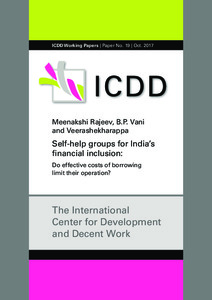| dc.date.accessioned | 2023-05-12T09:54:37Z | |
| dc.date.available | 2023-05-12T09:54:37Z | |
| dc.date.issued | 2017 | |
| dc.identifier | doi:10.19211/KUP9783737603850 | |
| dc.identifier.isbn | 978-3-7376-0385-0 (e-book) | |
| dc.identifier.uri | urn:nbn:de:0002-403854 | |
| dc.identifier.uri | http://hdl.handle.net/123456789/14697 | |
| dc.language.iso | eng | eng |
| dc.publisher | kassel university press | |
| dc.rights | Urheberrechtlich geschützt | |
| dc.rights.uri | https://rightsstatements.org/page/InC/1.0/ | |
| dc.subject.ddc | 330 | |
| dc.title | Self-help groups for India’s financial inclusion | eng |
| dc.type | Working paper | |
| dcterms.abstract | Ensuring accessibility to credit to the poor self-employed households is a critical concern for many developing nations. Self-help groups (SHG) formed by women in the developing countries help them to access financial intermediaries and access credit for various income-generating activities. In case of India, SHGs are formed either through state-assisted SHG-Bank Linkage Programme (SBLP) or through private initiatives of micro finance institutions (MFIs) or NGOs. Under the former, the groups access formal banking directly while in case of MFIs, loan is disbursed through MFIs themselves. Rate of interest in case of loans obtained by SHGs through SBLP, therefore, depends on the rate of interest charged by the various types of formal lending agencies and is often found to be lower than the interest charges of the MFIs. It is, however, argued that transaction costs involved in a bank loan are substantial, therefore, borrowers prefer loans from the informal sector, delivered at the borrower’s doorstep. In order to examine this issue rigorously, we have tried to estimate the effective costs towards borrowing by including the transaction costs, estimated using quantitative data collected through our survey. Our results show that the transaction costs contribute only marginally to the cost of borrowing, hence, we argue (using field data) that the programme, which has many additional benefits including ensuring financial inclusion of women and empowering them, should be strengthened and expanded further. | eng |
| dcterms.accessRights | open access | |
| dcterms.creator | Rajeev, Meenakshi | |
| dcterms.creator | Vani, B.P. | |
| dcterms.creator | Veerashekharappa | |
| dcterms.extent | 26 Seiten | |
| dc.contributor.corporatename | Kassel, Universität Kassel, International Center for Development and Decent Work (ICDD) | ger |
| dc.publisher.place | Kassel | |
| dc.relation.isbn | 978-3-7376-0384-3 (print) | |
| dc.subject.swd | Indien | ger |
| dc.subject.swd | Selbsthilfegruppe | ger |
| dc.subject.swd | Kreditaufnahme | ger |
| dc.subject.swd | Kosten | ger |
| dc.subject.swd | Zins | ger |
| dc.subject.swd | Transaktionskosten | ger |
| dc.title.subtitle | Do effective costs of borrowing limit their operation? | eng |
| dc.type.version | publishedVersion | |
| dcterms.source.series | ICDD Working Papers | |
| dcterms.source.volume | No. 19 | |
| kup.iskup | true | |
| kup.series | ICDD Working Papers | |
| kup.subject | Wirtschaftswissenschaft | |
| kup.typ | Monographie | |
| kup.institution | FB 05 / Gesellschaftswissenschaften | |
| ubks.nodoigen | true | |
| kup.binding | Softcover | |
| kup.size | DIN A4 | |


